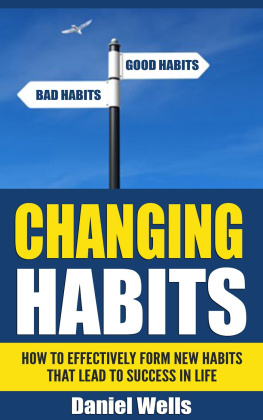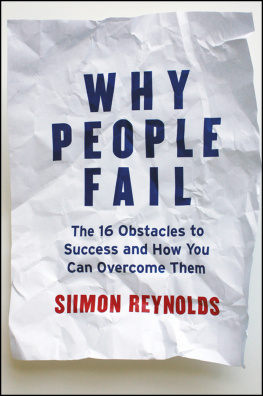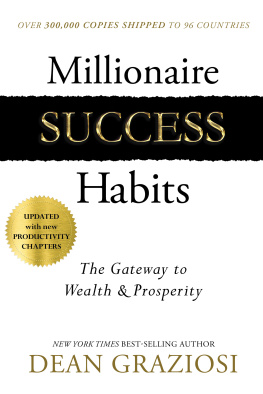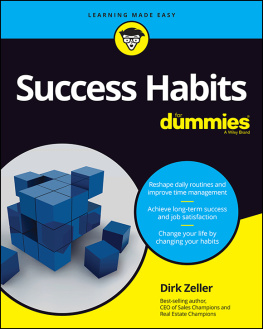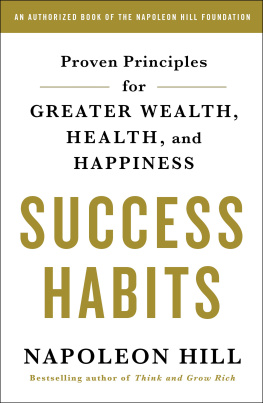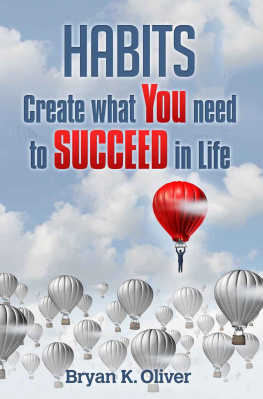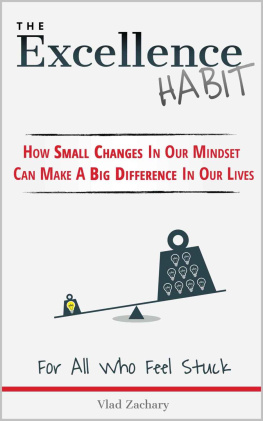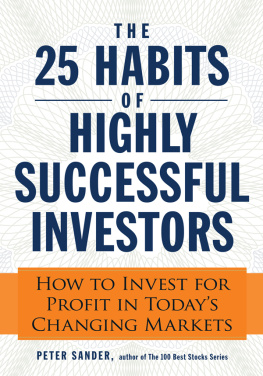Changing Habits
How to Effectively Form New Habits that Lead to Success in Life
Copyright 2015 by Daniel Wells
All Rights Reserved. No part of this publication may be reproduced in any form or by any means, including scanning, photocopying, or otherwise without prior written permission of the publisher or copyright owner.
Limits of Liability, Disclaimer of Warranties & Terms of Use
While all attempts have been made to verify the information provided in this publication, neither the author nor the publisher assumes any responsibility for errors, omissions, or contrary interpretations of the subject matter herein.
This book is for entertainment purposes only. The views expressed are those of the author alone, and should not be taken as expert instruction or commands. The reader is responsible for his or her own actions.
Adherence to all applicable laws and regulations, including international, federal, state, and local governing professional licensing, business practices, advertising, and all other aspects of doing business in the US, Canada, or any other jurisdiction is the sole responsibility of the purchaser or reader.
Neither the author nor the publisher assumes any responsibility or liability whatsoever on the behalf of the purchaser or reader of these materials.
Any perceived slight of any individual or organization is purely unintentional.
Please Leave a Review
Thank you for your purchase
I would be very grateful if you could please leave a review after you have read my book.
That review and feedback will help me to continuously improve the content in my books and make each and every one more relevant and helpful to you.
Thank you again.
Daniel Wells
Table of Contents
Introduction
E verybody chases success in life, but it is not easy to know what each one of them considers successful. Again, one would wonder if those with low self-esteem share this dream. What about the most ambitious people? Do they want success more than others? The bottom line is there are no ideal parameters for measuring achievement.
However, there are some factors that can come into play. Conventionally, failure or prosperity comes through a persons effort or lack of it. As such, it is fair to deduce that you have complete control of your destiny. In some sobering words, Aristotle once said, people are what they do in repetition. Then, excellence is a habit, not an act. This statement is a reminder nobody can become successful in an overnight.
It is a procedural activity that gets from one point in life to another. In the modern lives, it is a daunting to build habits because there are several distractions that can lead a person astray. The distractors can get you out of the narrow and straight paths to your old ways of going about things. As the saying goes, perfection is achievable through practice.
In order to alleviate some of the troubles that bar you from success, this eBook examines some academic studies on discipline, motivation, and habit building. The document also breaks down those findings into various actionable steps that a dedicated habit-builder can practice.
Chapter 1 The Importance of Goal-Setting
Set micro goals and macro objectives.
I n a comprehensive study about Motivation , a group of scholars discovered that abstract thinking is an effective tool to help with utmost discipline. In the most general sense, a big dream is the best equipment to help you start developing the habits that can drive towards success. Several varieties of research around the theory of Self-determination shows that building an intrinsic motivator is a crucial process of building habits that last. People should get motivation to do things by choice, not through rewards or punishments.
Therefore, you should look for ways of balancing your daily activities and desire to dream big. Usually, those dreams do not result in fast, dramatic results. However, there could be a change of things if you develop micro quotas and macro objectives . Here, your goals are the items of the big picture that you yearn to accomplish. On the other, the quotas symbolize the minimum amounts of tasks that you must do every day to turn your primary objective a reality. They make all your days approachable, and the goals become achievable in return.
A writer and developer, Barry Nathan, made an informative case study of the use of these goals to make things work out. He presented a story of someone who forced himself to write down articles of 100 words per day. He would strive for doing that by avoiding all distractions and writing at all costs. In the end, the result was impressive. He published three books, which fetched thousands of dollars in the markets. You do not have start from a high level because even the small steps count.
It might seem like a daunting task, but focusing on one goal at a time remains the most intensive way of solving all the problems at hand. The number of targets does not matter, just handle them one after the other. When you take on many of them at one ago, you end up spreading your focus and energy, yet you need all of them for a single goal.
So, how can you deal with five goals if you want to achieve them? Consider the following procedure. Pick the first one and focus on it first. If it is a long-term objective, split it into mini-goals that you can accomplish within the shortest time available, say one month. Pick the first action you can deal with on the first day. Repeat the same procedure for the entire target. Here, you have to execute one action every day as you pick up one mini-goal after another until the project reaches completion. You must deploy the same criterion for the remaining four goals.
Some activities are run-on, requiring you to set targets as long as they are operational. Examples include visiting the gym or blogging. In that case, you could transform them into habits until you ingrain them into your system. After which, you can focus on the next goal till you exhaust them.
Create Several Chains of Behavior
T he secret of creating lasting habits is much easier when you make use of your existing routines than when you try to fight or replace them. The rationale behind the if-then planning underlines the environmental factors that you can use to remind yourself to act on your habits. Widely known as implementation intentions , this concept involves using a regular bit of your routine to build a new one. In other words link it to the chain of other habits that you form to achieve an objective.
For example, instead of I will keep my house clean, you could opt for, I will change my clothes and wash the room/kitchen/ office. Many studies deem this strategy to be a successful way of relying on the contextual cues over a persons willpower. Always, you should opt for washing all the clothes when you get the time. That decision is better than, If it is a sunny day, then I will only wash the light clothes that need little sunlight to dry.
Eliminate Extra Options
S everal studies on self-control like the one available in the book, The Willpower Effect , reveal that there is the ultimate power in becoming an irksome person. For example, take President Obama Baracks insistence on wearing gray and blue suits to work. He said, I am trying to get the best way to pare decisions down. I do not want to come up with too many decisions about the foods I eat or the clothes I wear. Doing those activities will take up the time I need to make other decisions.
The presidents take has the support of a particular research, Vohs Kathleen and her colleagues , on self-control. The study echoes that making repeated choices depletes the mental energy of a person, even if those selections are mundane and very pleasant. The Harvard Business Review affirms that you need to carry out two activities if you are interested in maintaining long-term discipline. You must Identify all your life aspects that you think mundane for starters. After which, you routinize them in the best way you deem suitable. In other, do not make very many decisions.
Next page
